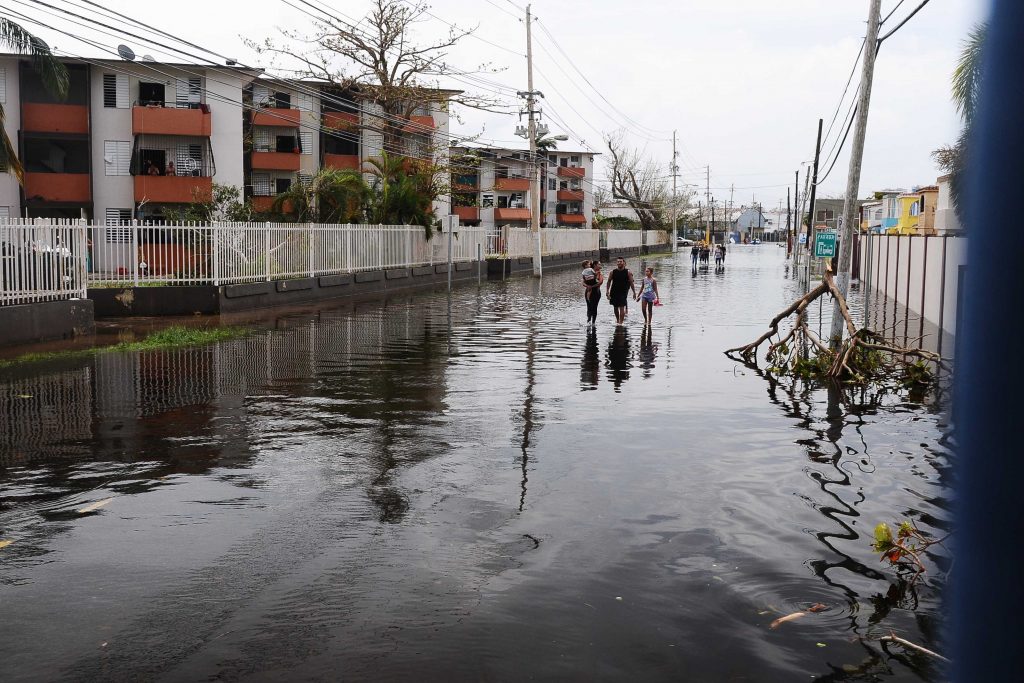The United States is becoming an extraction economy (like Puerto Rico)

Puerto Rican residents walk in flooded streets in Condado, San Juan, Puerto Rico, Sept. 22, 2017, following Hurricane Maria. Puerto Rico National Guard photo by Sgt. Jose Ahiram Diaz-Ramos
While watching Trump troll us with Puerto Rico, one question kept popping up: why?
In some ways it’s obvious why he’s trolling us. He wants to distract us from what his team of billionaires is doing in Washington and control the news cycle.
But why troll us by going to Puerto Rico?
The answer is that he’s there to show us that they are poor and we are not, and that we should be afraid of ending up like them. In other words, he’s campaigning. He’s telling the country that he knows what’s best because he’s a rich businessman.
This is a variation on the corporate special interest group propaganda we see so much of: Everything that is good is business, capitalism. Everything that is bad is socialism.
Sadly, it’s working.
The reason it’s working isn’t because it’s right, but because so many people believe and repeat these terrible ideas about what’s made us a successful country.
Everyone I talk to knows something is wrong with our country. Yet many think the only people who know how to solve it are the “good” business people of our country. This is a big reason Trump won.
People don’t know why and how Puerto Rico is the way it is and they think we need people like Trump. What we need is a better story about why Puerto Rico is poor, how it’s run as an extraction economy, why this is bad, and why all the successful economies of the world tend to be democratic.
Economists Daron Acemoglu and James Robinson ask a great question in their book Why Nations Fail: The Origins of Power, Prosperity, and Poverty: Why are some nations rich and others poor?
When asked this question, most people talk about why a business succeeds or fails. By analogy, they transfer this onto a country.
But countries aren’t companies. And an economy isn’t a single business.
For these reasons, Acemoglu and Robinson’s work is helpful, even though there’s much about present-day America and our economy that they don’t touch on. This said, some of the concepts they introduce I haven’t seen discussed elsewhere. And they most certainly don’t tend to be part of our national conversation.
Two types of economies: Extraction and inclusion
An extraction economy is what it sounds like. It’s an economy that is run for a few people. All of the benefits go to a few and the vast majority of people are left out. Most of what we call third-world countries are extraction economies.
An inclusion economy, by contrast, is an economy that benefits the people of the country more broadly.
Some of the characteristics of an inclusion economy (aka growth economy) according to Acemoglu and Robinson are:
- Inclusive economic institutions
- The ability and freedom for people to pursue what they want to pursue
- The resources and opportunity to pursue what they want to pursue (political freedom means nothing if you don’t have the means to pursue new economic opportunities)
- Technical innovation and a society that encourages technical innovation
- Investment in people and education
- The ability to mobilize the talents and skills of a large number of people
The critical finding of Acemoglu and Robinson is that to create an inclusion economy requires politics. Not only that, but the type of political system a country has determines whether the country will have an inclusion economy or an extraction economy.
Concentrated power leads to extraction economies:
If the distribution of power is narrow and unconstrained, then the political institutions are absolutist, as exemplified by the absolutist monarchies reigning throughout the world during much of history. Under absolutist political institutions such as those in North Korea and Latin America, those who wield this power will be able to set up economic institutions to enrich themselves and augment their power at the expense of society.
Broadly distributed power (democracy being the best example) leads to inclusion economies:
Political institutions that distribute power broadly and subject it to constraints are pluralistic. Instead of being vested in a single individual or a narrow group, political power rests with a broad coalition or a plurality of groups.
This is very different from the narrative we usually hear (capitalism versus socialism), though there are some similarities.
We hear some of the economic story and none of the political story. We hear that freedom of pursuit and technical innovation is good while a centralized economy is bad. The reason for this is that most of what we hear is designed as propaganda to push certain goals of corporate special interests, special interests that seem to be just fine with an extraction economy.
What we don’t tend to hear from corporate media is 1) how important democracy is to an inclusion economy, and 2) how inclusion economies require reinvestment in education and people.
How this relates to Puerto Rico
Puerto Rico’s problems go way back. The origins of the crisis date back to its having a unique bond status. Puerto Rican bonds carried a triple tax exemption with yields above what banks offer even in high-yield savings accounts. Prompted by the tax advantage, the country issued too many bonds and began relying on borrowed money from bonds to balance its budget.
You can read about the history of the crisis elsewhere. The end result is that Puerto Rico is now run largely by U.S. hedge funds.
University of Puerto Rico professor Rafael Bernabe described the economy as:
The economy of Puerto Rico is mainly controlled by US corporations, which generate a tremendous amount of profit that is not reinvested and does not create economic growth. It’s a cycle of dependency that reproduces itself.
We saw this in 2009 when the New Progressive Party instituted reforms to try and deal with the debt that were recommended by the hedge funds with the sole goal of repaying the hedge funds.
- Fired 30,000 public employees
- Cut taxes for the rich
- Privatized assets
- Deregulated business
- And increased the cost of public education
In other words, the government tried austerity. It tried to “cut” its way out of the problem. This only exacerbated the problem:
Per capita income in Puerto Rico is almost half that of Mississippi, the US’s poorest state. The jobless rate is 12.6%; in West Virginia, the state with the highest unemployment rate in the US, that number is 7.4%. Puerto Rico’s labor participation rate is around 43%, 20 points lower than in the US as a whole. Median household income is almost $7,000 less than in Detroit (and less than half of the US average). And a staggering 45% of the population lives in poverty (compared to about 15% in the US).
Puerto Rico looks like an extraction economy. Salaries don’t match productivity, most of the wealth produced leaves the island and returns to the United States, and debt is used to loot any remaining wealth.
In 2016, a control board was appointed to try to help manage the financial crisis. But by and large, the control board seems to be concerned with the narrow interests (Wall Street hedge funds) that hold 43 percent of Puerto Rican debt.
And Puerto Rico can’t currently declare bankruptcy, though the current governor has declared that the debt is unpayable.
What Acemoglu and Robinson would argue is that the island has always been run for narrow interests. Once upon a time, it was run for the sugar industry. Today, it’s run for hedge funds in the United States.
The United States as an extraction economy
Now that we have some better ideas in place for talking about what makes economies successful, we can talk about what’s happening in the United States.
We see many of the same things going on in our country that have led to economies that work only for a few. We’ve seen and are seeing consolidation of power and rule by corporate special interests and the wealthy.
In my home state of Ohio, we have a Republican government that is virtually impossible to displace due to gerrymandering at both the state and federal levels. This government has run the state not for the people of Ohio, but largely for Wall Street and the oil and gas industry.
Here’s what this has looked like:
- Elimination of the estate tax and other taxes that impact the wealthy most (these do nothing but help to create stock bubbles)
- Cuts to public education, again and again
- Privatizing public schools and other government functions
- Cuts to cities and small towns
- A hands-off approach to the fracking industry including some of the lowest taxes in the nation on fracking drillers
- Shifting costs and risk downward onto the 99 percent (privatize the profits, socialize the risk)
And our governor is described in the media as a “moderate!” States like Oklahoma and Kansas and Louisiana have fared much worse under corporate special interest group rule.
Now, with the oil industry and Goldman Sachs in control of the White House, the Trump administration is looking to ramp up the extraction.
Betsy DeVos is in charge of selling off education and the cost-shifting efforts (under the ruse of “tax reform”) are looking to create an additional $2.2 trillion in additional debt through tax cuts primarily targeted at America’s wealthiest:
- The top rate for America’s wealthiest will drop from 39.6 percent to 35 percent
- Elimination of the estate tax (which only affects estates over $5.49 million, $11 million for married couples)
- A drop for “pass-through entities” from 39.6 percent to 25 percent (this is primarily a gift to small, very wealth firms like hedge funds and law firms)
- Getting rid of the alternative minimum tax (AMT) which primarily affect people making more than $500,000 per year
- A super low rate on repatriating money overseas (This helps the Microsofts and Apples of the world who tend to buy back stock when this money comes home—again, boosting the stock market)
- Leaving the carried interest loophole in place (Again, largely benefits billionaire hedge fund managers)
We’re told that we have to do all of this to “free” markets.
What we’re really doing is shifting more wealth to the narrow Wall Street interests that control our country. The more we do this, the more we look like an extraction economy.
If we wanted broad prosperity, instead of extracting, we’d be investing in our country as we grew and as we do well. We’d be paying people more. We’d be investing in education and infrastructure and research.
The reason we’re not is because our country has fallen under the control of a narrow interest. If we want an inclusion economy that works for the people of our country, we’re going to have to remember the importance of politics and democracy.
If we really want a stronger economy, we need to restore our democratic institutions.
David Akadjian is the author of The Little Book of Revolution: A Distributive Strategy for Democracy (ebook now available). Cross posted at Daily Kos.











